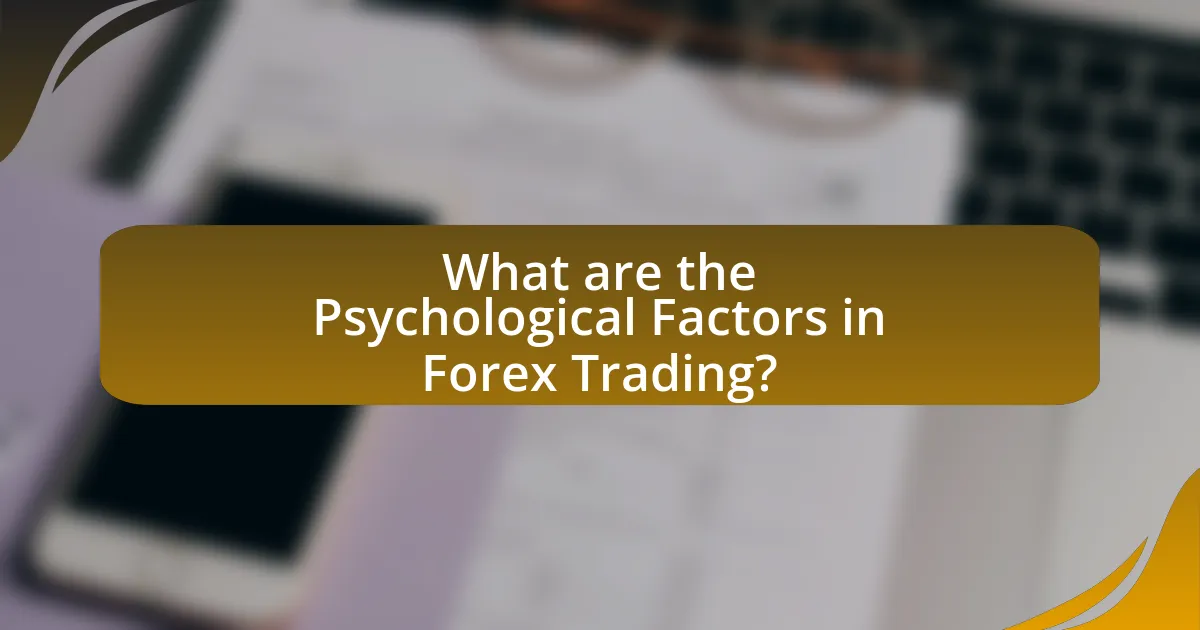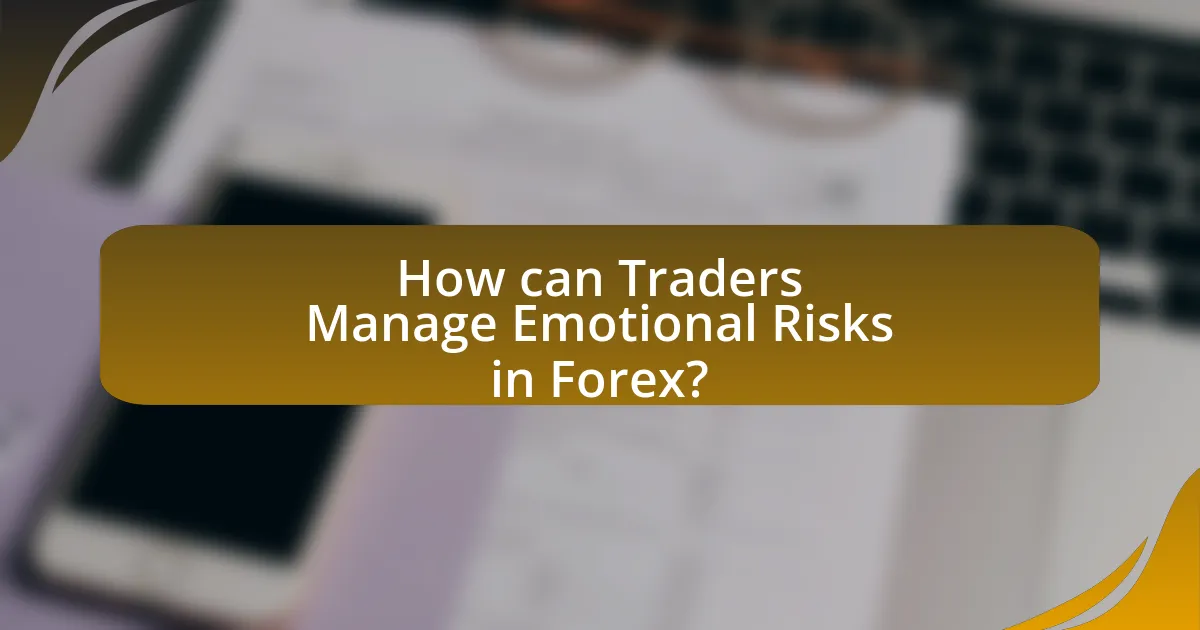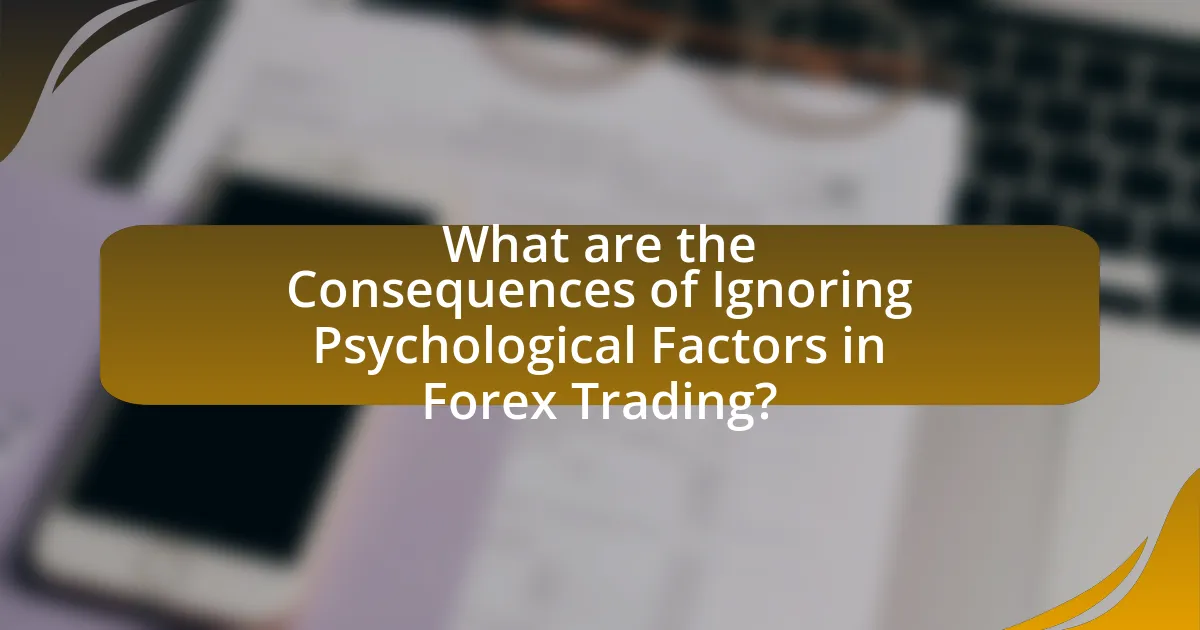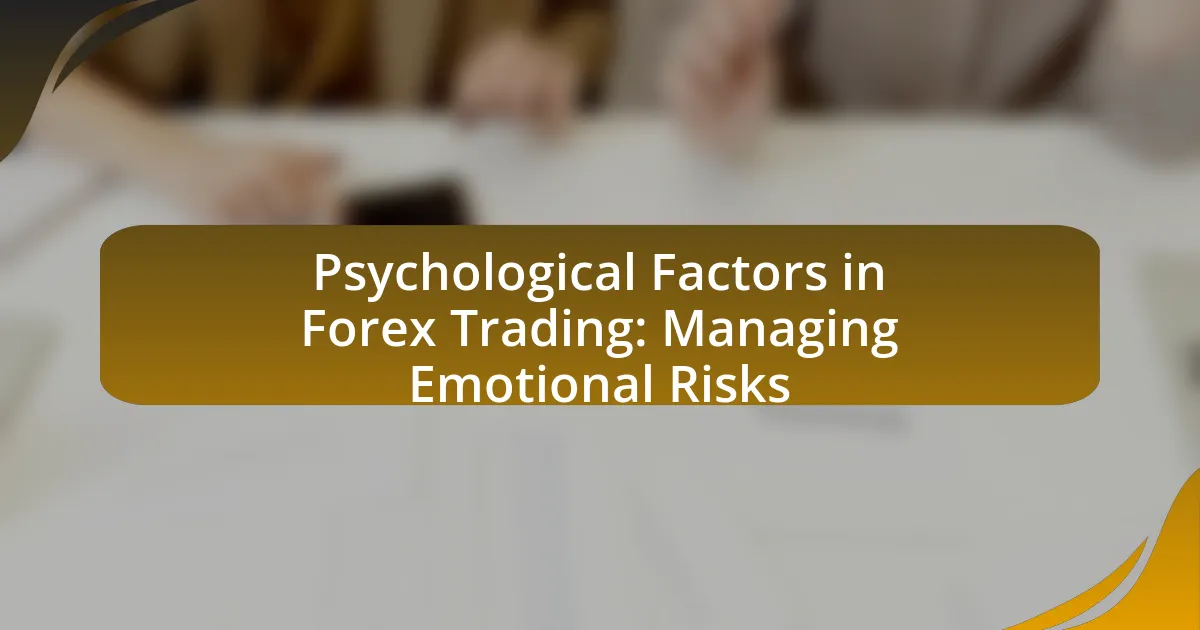The article focuses on the psychological factors influencing Forex trading, emphasizing the impact of emotions such as fear, greed, overconfidence, and anxiety on traders’ decision-making processes. It highlights the importance of emotional regulation and emotional intelligence in achieving successful trading outcomes, detailing how these factors can lead to impulsive behaviors and financial losses. Key strategies for managing emotional risks include developing a structured trading plan, practicing mindfulness, and maintaining a trading journal. The article also discusses the long-term consequences of ignoring psychological factors and offers practical tips for enhancing emotional resilience in trading.

What are the Psychological Factors in Forex Trading?
The psychological factors in Forex trading include emotions such as fear, greed, overconfidence, and anxiety, which significantly influence traders’ decision-making processes. Fear can lead to missed opportunities or premature exits from trades, while greed may result in taking excessive risks. Overconfidence often causes traders to underestimate market volatility, leading to significant losses. Anxiety can impair judgment and lead to indecision. Research indicates that emotional regulation is crucial for successful trading, as traders who manage their emotions effectively tend to perform better in volatile markets.
How do emotions influence trading decisions in Forex?
Emotions significantly influence trading decisions in Forex by affecting traders’ judgment and behavior. Fear can lead to impulsive selling during market downturns, while greed may result in over-leveraging and taking excessive risks. Research indicates that emotional responses can cause traders to deviate from their strategies, leading to losses; for instance, a study by Lo et al. (2005) found that emotional states can impair decision-making processes, resulting in suboptimal trading outcomes. Additionally, the presence of anxiety can lead to hesitation in executing trades, while overconfidence can result in ignoring market signals. Thus, managing emotions is crucial for maintaining discipline and making rational trading decisions in Forex.
What specific emotions impact Forex traders the most?
Fear and greed are the specific emotions that impact Forex traders the most. Fear can lead to hesitation and missed opportunities, while greed often results in overtrading and taking excessive risks. Research indicates that these emotions can significantly influence decision-making processes in trading environments, leading to irrational behaviors. For instance, a study published in the Journal of Behavioral Finance found that traders driven by fear tend to exit positions prematurely, while those motivated by greed may hold onto losing trades longer than advisable, ultimately affecting their overall performance.
How do fear and greed manifest in trading behavior?
Fear and greed manifest in trading behavior through emotional decision-making that influences traders’ actions. Fear often leads to panic selling during market downturns, causing traders to exit positions prematurely to avoid losses. For instance, a study by the Behavioral Finance Network found that fear can result in a 30% increase in selling activity during market declines. Conversely, greed drives traders to take excessive risks, such as holding onto winning positions for too long or investing in high-risk assets without proper analysis, often leading to significant losses. Research from the Journal of Behavioral Finance indicates that greed can lead to a 25% increase in trading volume during bullish markets. These emotional responses significantly impact trading strategies and outcomes, highlighting the importance of managing psychological factors in Forex trading.
Why is emotional intelligence important for Forex traders?
Emotional intelligence is crucial for Forex traders because it enables them to manage their emotions effectively, leading to better decision-making and risk management. Traders with high emotional intelligence can recognize their emotional triggers, maintain discipline during volatile market conditions, and avoid impulsive decisions driven by fear or greed. Research indicates that emotional intelligence contributes to improved trading performance; for instance, a study published in the Journal of Behavioral Finance found that traders with higher emotional intelligence exhibited greater resilience and adaptability, which are essential traits for navigating the complexities of Forex markets.
How can emotional intelligence improve trading outcomes?
Emotional intelligence can significantly improve trading outcomes by enabling traders to better manage their emotions, make rational decisions, and maintain discipline during volatile market conditions. Traders with high emotional intelligence can recognize their emotional triggers, such as fear and greed, which often lead to impulsive decisions. For instance, a study published in the Journal of Behavioral Finance found that traders who practiced emotional regulation techniques experienced a 20% increase in their trading performance compared to those who did not. This ability to control emotions allows traders to stick to their strategies, avoid overreacting to market fluctuations, and ultimately achieve more consistent results.
What strategies can traders use to enhance their emotional intelligence?
Traders can enhance their emotional intelligence by practicing self-awareness, developing emotional regulation techniques, and engaging in reflective practices. Self-awareness allows traders to recognize their emotional triggers and responses, which is crucial for making informed decisions. Techniques such as mindfulness meditation can help in regulating emotions, reducing impulsive trading behaviors. Reflective practices, such as journaling about trading experiences, enable traders to analyze their emotional responses and learn from them, fostering continuous improvement. Research indicates that traders who actively engage in these strategies tend to perform better, as they can manage stress and maintain focus during volatile market conditions.
What role does mindset play in Forex trading success?
Mindset plays a crucial role in Forex trading success by influencing decision-making, risk management, and emotional resilience. A trader’s mindset affects their ability to remain disciplined, adhere to trading plans, and manage stress during volatile market conditions. Research indicates that traders with a positive and growth-oriented mindset are more likely to learn from their mistakes and adapt their strategies effectively, leading to improved performance. For instance, a study published in the Journal of Behavioral Finance found that traders who maintained a constructive mindset were better at coping with losses and exhibited greater long-term profitability. This evidence underscores the importance of cultivating a strong, focused mindset to achieve success in Forex trading.
How can a positive mindset affect trading performance?
A positive mindset can significantly enhance trading performance by improving decision-making and emotional resilience. Traders with a positive outlook are more likely to remain calm under pressure, which helps them avoid impulsive decisions driven by fear or greed. Research indicates that a positive mindset can lead to better risk management, as optimistic traders tend to stick to their trading plans and strategies, reducing the likelihood of emotional trading mistakes. For instance, a study published in the Journal of Behavioral Finance found that traders with a positive attitude exhibited higher levels of patience and discipline, leading to more consistent profits over time.
What are common mindset pitfalls for Forex traders?
Common mindset pitfalls for Forex traders include overconfidence, fear of missing out (FOMO), and emotional trading. Overconfidence leads traders to underestimate risks and over-leverage their positions, often resulting in significant losses. Fear of missing out causes traders to enter trades impulsively, driven by the anxiety of missing potential profits, which can lead to poor decision-making. Emotional trading occurs when traders allow their feelings, such as fear or greed, to dictate their actions rather than following a disciplined trading plan. These pitfalls are well-documented in trading psychology literature, emphasizing the importance of maintaining a rational mindset to improve trading outcomes.

How can Traders Manage Emotional Risks in Forex?
Traders can manage emotional risks in Forex by implementing a structured trading plan and adhering to strict risk management rules. A well-defined trading plan includes clear entry and exit strategies, which help traders avoid impulsive decisions driven by emotions. Additionally, setting stop-loss orders can limit potential losses, reducing anxiety during trades. Research indicates that traders who follow a disciplined approach are more likely to achieve consistent results, as emotional decision-making often leads to poor trading outcomes. For instance, a study published in the Journal of Behavioral Finance found that emotional factors significantly impact trading performance, highlighting the importance of emotional regulation in Forex trading.
What techniques can help traders control their emotions?
Traders can control their emotions through techniques such as mindfulness meditation, cognitive behavioral strategies, and maintaining a trading journal. Mindfulness meditation helps traders become aware of their emotional responses, allowing them to manage stress and anxiety effectively. Cognitive behavioral strategies enable traders to identify and challenge irrational thoughts that may lead to emotional decision-making. Additionally, keeping a trading journal allows traders to reflect on their decisions and emotional states, fostering self-awareness and discipline. Research indicates that these techniques can significantly improve emotional regulation, leading to better trading outcomes.
How does mindfulness practice benefit Forex traders?
Mindfulness practice benefits Forex traders by enhancing their emotional regulation and decision-making abilities. By cultivating present-moment awareness, traders can reduce anxiety and stress, which are common in the volatile Forex market. Research indicates that mindfulness can lead to improved focus and clarity, allowing traders to analyze market conditions more effectively. A study published in the Journal of Behavioral Finance found that individuals who practiced mindfulness exhibited better emotional control and made more rational trading decisions, ultimately leading to increased profitability.
What role does journaling play in managing trading emotions?
Journaling plays a crucial role in managing trading emotions by providing traders with a structured method to reflect on their thoughts, feelings, and decisions during trading activities. This practice allows traders to identify emotional triggers, patterns in their behavior, and the impact of emotions on their trading performance. Research indicates that self-reflection through journaling can enhance emotional awareness and regulation, leading to improved decision-making. For instance, a study published in the Journal of Behavioral Finance found that traders who maintained a trading journal reported lower levels of anxiety and increased confidence in their trading strategies, demonstrating the effectiveness of journaling in emotional management.
Why is risk management crucial for emotional stability?
Risk management is crucial for emotional stability because it helps individuals mitigate potential losses and reduce anxiety associated with uncertainty. In the context of Forex trading, effective risk management strategies, such as setting stop-loss orders and diversifying investments, enable traders to maintain control over their financial exposure. Research indicates that traders who implement structured risk management techniques experience lower levels of stress and emotional turmoil, as they are better prepared for market fluctuations. This preparedness fosters a sense of security, allowing traders to make rational decisions rather than emotional ones, ultimately leading to improved performance and emotional well-being.
How can setting stop-loss orders reduce emotional stress?
Setting stop-loss orders can significantly reduce emotional stress by providing a predefined exit strategy that limits potential losses. This structured approach allows traders to make decisions based on their trading plan rather than emotional reactions to market fluctuations. Research indicates that traders who utilize stop-loss orders experience lower anxiety levels, as they feel more in control of their trades and less vulnerable to impulsive decisions driven by fear or greed. By establishing clear risk parameters, traders can focus on strategy and analysis, rather than the emotional turmoil that often accompanies trading losses.
What are the best practices for maintaining a balanced trading plan?
The best practices for maintaining a balanced trading plan include setting clear goals, implementing risk management strategies, and regularly reviewing performance. Clear goals provide direction and help traders stay focused on their objectives, while risk management strategies, such as setting stop-loss orders and position sizing, protect against significant losses. Regular performance reviews allow traders to assess their strategies, identify areas for improvement, and adjust their plans accordingly. These practices are essential for sustaining emotional stability and making informed decisions in the volatile forex market.

What are the Consequences of Ignoring Psychological Factors in Forex Trading?
Ignoring psychological factors in Forex trading can lead to significant financial losses and poor decision-making. Traders who overlook emotions such as fear and greed may engage in impulsive trading behaviors, resulting in increased volatility in their trading performance. Research indicates that approximately 70% of retail traders lose money, often due to emotional biases that cloud judgment and lead to irrational choices. Furthermore, neglecting psychological aspects can cause traders to deviate from their trading plans, increasing the likelihood of overtrading or holding onto losing positions longer than necessary. This behavior not only exacerbates losses but also contributes to a cycle of stress and anxiety, further impairing trading performance.
How can emotional trading lead to financial losses?
Emotional trading can lead to financial losses by causing traders to make impulsive decisions based on fear or greed rather than rational analysis. When traders allow emotions to dictate their actions, they may enter or exit trades at inappropriate times, resulting in missed opportunities or significant losses. For instance, a study by the University of California found that emotional decision-making can lead to a 20% decrease in trading performance, highlighting the detrimental impact of emotions on financial outcomes.
What are the signs of emotional trading behavior?
The signs of emotional trading behavior include impulsive decision-making, overtrading, and a heightened response to market fluctuations. Impulsive decision-making occurs when traders act on emotions rather than analysis, often leading to poor choices. Overtrading is characterized by excessive buying or selling, driven by fear of missing out or the desire to recover losses. A heightened response to market fluctuations manifests as extreme reactions to price changes, resulting in anxiety or euphoria. These behaviors are well-documented in trading psychology literature, indicating that emotional influences can significantly impair trading performance.
How can traders recognize when emotions are affecting their decisions?
Traders can recognize when emotions are affecting their decisions by monitoring their physiological responses and behavioral patterns during trading. For instance, increased heart rate, sweating, or feelings of anxiety often indicate emotional distress, which can lead to impulsive trading decisions. Research shows that emotional trading can result in significant financial losses; a study by the University of California found that traders who reported high levels of stress were 30% more likely to make poor investment choices. Additionally, traders should reflect on their decision-making process, noting whether they are acting based on fear or greed rather than analysis. Recognizing these signs allows traders to implement strategies to mitigate emotional influences, such as setting predefined trading rules or taking breaks to regain composure.
What long-term effects can emotional mismanagement have on traders?
Emotional mismanagement can lead to significant long-term effects on traders, including chronic stress, impaired decision-making, and financial losses. Chronic stress from emotional mismanagement can result in burnout, which negatively impacts a trader’s ability to perform effectively over time. Impaired decision-making often manifests as impulsive trading behaviors, leading to increased risk-taking and poor investment choices. Financial losses can accumulate due to these poor decisions, ultimately affecting a trader’s capital and long-term viability in the market. Studies have shown that traders who fail to manage their emotions are more likely to experience these adverse outcomes, reinforcing the importance of emotional regulation in trading success.
How does emotional burnout impact trading performance?
Emotional burnout significantly deteriorates trading performance by impairing decision-making abilities and increasing susceptibility to emotional trading. When traders experience burnout, their cognitive functions decline, leading to poor judgment and impulsive actions, which can result in substantial financial losses. Research indicates that emotional exhaustion can lead to a 30% decrease in performance metrics among traders, as they struggle to maintain focus and discipline. Furthermore, studies show that traders suffering from burnout are more likely to engage in risky behaviors, such as overtrading or deviating from established strategies, further exacerbating their losses.
What strategies can traders implement to recover from emotional setbacks?
Traders can implement several strategies to recover from emotional setbacks, including establishing a structured trading plan, practicing mindfulness, and engaging in regular self-reflection. A structured trading plan helps traders maintain discipline and reduces impulsive decisions driven by emotions. Mindfulness techniques, such as meditation or deep-breathing exercises, can help traders manage stress and regain focus. Regular self-reflection allows traders to analyze their emotional responses and learn from past experiences, fostering resilience. Research indicates that emotional regulation strategies can significantly improve trading performance, as evidenced by studies showing that traders who employ such techniques experience lower levels of anxiety and improved decision-making abilities.
What practical tips can help Forex traders manage emotional risks effectively?
Forex traders can manage emotional risks effectively by implementing a structured trading plan, maintaining a disciplined approach, and utilizing risk management strategies. A structured trading plan outlines specific entry and exit points, which helps traders avoid impulsive decisions driven by emotions. Maintaining discipline involves adhering to the trading plan and avoiding overtrading, which can lead to emotional distress. Additionally, employing risk management strategies, such as setting stop-loss orders and limiting the amount of capital risked on each trade, can mitigate the impact of emotional reactions to market fluctuations. These practices are supported by research indicating that emotional regulation is crucial for successful trading outcomes, as traders who follow structured approaches tend to experience less emotional turmoil and make more rational decisions.
How can traders develop a personal emotional management plan?
Traders can develop a personal emotional management plan by first identifying their emotional triggers and establishing clear trading rules. This involves self-reflection to recognize emotions such as fear, greed, and frustration that can impact decision-making. Once triggers are identified, traders should create specific strategies to manage these emotions, such as setting stop-loss orders to mitigate fear of loss or using a trading journal to reflect on emotional responses to trades. Research indicates that traders who implement structured emotional management techniques experience improved performance and reduced stress levels. For example, a study published in the Journal of Behavioral Finance found that emotional regulation strategies significantly enhance trading outcomes.
What resources are available for improving emotional resilience in trading?
Resources available for improving emotional resilience in trading include psychological training programs, trading psychology books, and online courses focused on emotional management. Psychological training programs, such as those offered by the Trading Psychology Coach, provide structured approaches to developing mental toughness and emotional control. Books like “The Psychology of Trading” by Brett N. Steenbarger offer insights into the emotional challenges traders face and strategies to overcome them. Additionally, online platforms like Coursera and Udemy feature courses specifically designed to enhance emotional resilience in trading, teaching techniques such as mindfulness and cognitive behavioral strategies. These resources are validated by numerous traders who report improved performance and reduced emotional distress through their use.
